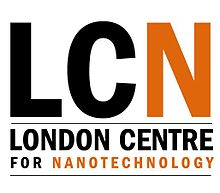London Centre for Nanotechnology
 |
|
| Established | 2003 |
|---|---|
| Director | Professor Gabriel Aeppli Professor Milo Shaffer |
|
Administrative staff
|
Around 130 |
| Location | London, United Kingdom |
| Website | London Centre for Nanotechnology |
The London Centre for Nanotechnology is a multidisciplinary research centre in physical and biomedical nanotechnology in London, United Kingdom. It brings together two institutions that are world leaders in nanotechnology, University College London and Imperial College London. It was conceived from the outset with a management structure allowing for a clear focus on exploitation and commercialisation. Although based at UCL's campus in Bloomsbury, the LCN includes research in departments of Imperial's South Kensington campus.
The LCN's work requires it to draw on the combined skills of multiple departments, including medicine, chemistry, physics, electrical and electronic engineering, biochemical engineering, materials and earth sciences, and two leading business centres. The LCN’s stated vision is to become Europe’s premier research centre in nanotechnology applied to health care, information technology and the environment.
The London Centre for Nanotechnology was established as a joint venture between UCL and Imperial College London in 2003 following the award of a £13.65m higher education grant under the Science Research Infrastructure Fund. In October 2006 the LCN installed the first monochromated electron microscope in the UK at its site on the Imperial College London campus.
In October 2008 the LCN published research about the possibility of using microscopic "nanoprobes" to discover new drugs to combat antibiotic resistance. In October 2009 a team at the Science and Technology Facilities Council's ISIS facility led by Stephen Bramwell of the LCN published research showing that single magnetic charges be made to behave and interact like electrical ones through the use of the magnetic monopoles that exist in spin ice.
LCN's research is organised around three themes, which it characterizes as follows:
• Information Technology: Computing and communications needs continue to grow and underpin all other human endeavours. Current technologies are limited and new nanotechnology-driven paradigms such as quantum computing and spintronics are needed.
• Health care: Under development are specialised sensors and novel cancer-diagnosis systems, as well as new insights into cellular biophysics and nanotechnology-based instrumentation.
...
Wikipedia
